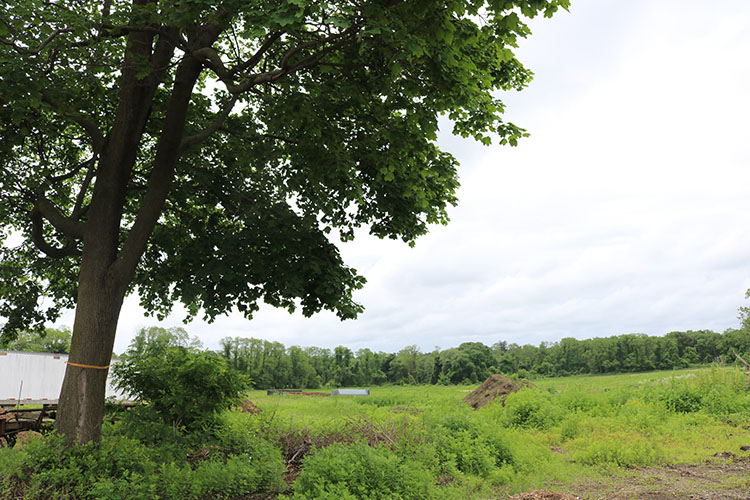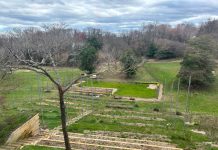Farmland Manager Wants to Stop Development Project
By Jay Cook |
But a sloped, gravel driveway opens up to a sprawling farm on about 76 acres that’s almost entirely isolated from its commercial and residential neighbors. It’s where David Ham, the property manager and owner of Pilgrim Farm Management, makes a living by processing wood and lumber for resale as organic topsoil and mulches.
That farm is more than half of the entire Mountain Hill tract, a 118-acre property owned by the Azzolina and Scaduto families stretching from Kings Highway East to Kanes Lane along Route 35. Possible development there has been discussed for nearly two decades and recently it’s been one of Middletown’s most contentious topics. Prospective developers hope to acquire the land and build but some residents are pushing back to limit the development.
Ham, on the other hand, is aiming for preservation. He envisions a preserved farm thriving while supporting a retail and wholesale organic produce agribusiness.
“You can’t make this,” Ham, 61, said about the farm last weekend. “You can’t produce it, you can’t reproduce it. It is what it is, a gift from the man upstairs.”
“This is the history of this town,” he said. “If we let this one go, we’ve really done something wrong.”

There’s A Farm Back There?
A barn greets visitors at the front of the property, but dozens of work trucks, working farm equipment and even an old sailboat are strewn across the entrance beside a cabin said to date back 150 years.
He estimates that 56 to 70 acres of the total 118 acres contain prime soil for crops. Southern exposure from the sun warms the rich marl soil there to make for a distinctive farming experience, Ham said.
Stopping Development
Ham recently became involved in Minding Middletown, a grassroots citizens organization fighting the proposed development on those 118 acres. National Realty & Development Corp. (NRDC) has been before the township’s planning board in the past year to develop a proposed 340,000-square-foot shopping center on 54 acres along Route 35 with a Wegmans Food Market and a CMX Cinema movie theater. Toll Brothers had also applied to build 280 market-rate townhomes plus 70 affordable units but has rescinded that plan.
“It’s all about stopping this NRDC (project),” said Ham. “People in town are adamantly against any development on this property.”
He’s in a tricky situation, though. Ham operates the property for Mountain Hill, the same group looking to sell the property.
What Can Be Done?
Ham, a second-generation farmer originally from Englishtown, views the farm as an essential piece of Middletown. If a private purchase was completed, he proposes to expand the current farming scope to be a training ground for local youth, special needs students and college graduates.
He envisions the property supporting an organic agribusiness with produce farmed straight from the land tied into a wholesale and retail operation. Other farmers from Monmouth County would be welcome to sell produce there as well, he said.
Monmouth Conservation Foundation executive director Bill Kastning said at the meeting his board of trustees is in favor of preserving the farm portion if the 54-acre commercial complex on highway frontage is to be developed.
Kastning also confirmed a private investor is in the mix.
“There’s very few farms in Middletown and therefore it behooves us to consider this because there’s not much left,” he said.
The county agriculture development board didn’t outright support a preservation effort there but did agree to investigate it further with more information from Ham and Kastning.
This article was first published in the June 7-14, 2018 print edition of The Two River Times.














